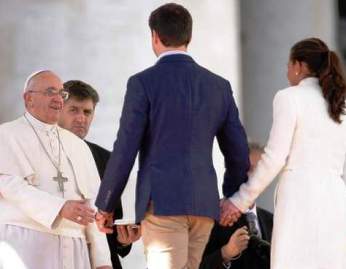On Valentine’s Day, in front of 25,000 people, Pope Francis declared that the key to a lasting marriage lies in just three words: “Please, thanks and sorry.”
The Associated Press reported (Feb. 14) that “Francis told fiancés gathered in St. Peter’s Square for a special papal date that expressions of courtesy, gratitude and contrition go a long way toward conserving and enhancing love over time.

” ‘Never finish the day without making peace!’ he begged them. ‘Because if you end the day without making peace, what you have inside becomes hard and cold and it becomes harder to make peace the following day.’
Francis said “The perfect family doesn’t exist, nor the perfect husband nor wife. Let’s not even talk about the perfect mother-in-law,” he joked. In addressing the couples present, Francis reminded them about respect, “to request politely so that you enter with courtesy into the life of the other.”
My take: why stop there? Why not demonstrate that same kind of consideration and respect with everyone we interact with?
“The ethical value of respect is fundamental,” ethicist and teacher Michael Josephson says. “It imposes a moral duty to treat all persons with respect. This means that we recognize and honor each person’s right to autonomy and self-determination, privacy and dignity.”
In my book, What Do You Stand For?, former Hampton University student Jennifer Westbrook shares a personal story on the importance of recognizing the dignity of others.
“A homeless man sat alone on a park bench amongst the horde of people in the park. No one sat on the bench with him because he was distinctly different from the professionals and the tourists. People were reluctant to be near him because his clothes were old, dirty, and torn, and his hair was unkempt. I was amazed that people acted as though he was not there as they carefully walked around him, avoiding his thoughtful stare.
“As I observed more closely, I realized that they could not possibly help but see and hear him because he was speaking with the power of a great preacher or lecturer. His voice was so strong that it seemed to shake the very bench that I sat on and reverberate throughout the park. Some dismissed his speeches as pure gibberish, but I had an inclination that there was more to this man than met the eye.
“One day I sat close by to listen intently to what he was saying, and I was immediately entranced and intrigued. The man rose from his bench and paced the sidewalk. As he approached my bench and began speaking, I saw that he avoided making eye contact with his observers. I sensed that he did this to put his audience at ease by speaking generally to the crowd, even though he directed his lectures to individuals he observed. He seemed to know just what message to deliver.
“On this particular day, his message was for me. The old man asked, “What is your purpose in life? What makes you different from everyone else in this world? How will you live your life differently from everyone else’s?” He walked away, but not before uttering that everyone should believe in something.
“I walked the block from my office at the FDIC to that park regularly, and I always saw this man on that same bench. Each time I went there, I noticed him regularly checking his watch. One day I approached him and asked for the time, although I knew what time it was. He paused for a moment, looking shocked that he had been spoken to, and then thoughtfully replied, “It’s a quarter to one. God bless you.” In that moment I knew he understood that I acknowledged and appreciated him and saw value and meaning in what he committed himself to doing each day.
“Ever since that day, I have pondered and reflected upon his words, and I have since realized the importance of believing in something worthwhile. I believe in taking notice of all that is around me, just as I noticed the homeless lecturer that no one truly cared to see. I believe in looking deep inside myself and the world to find greater truth and meaning. I stand for doing the unexpected. I stand for seeing the value in people rather than focusing on adverse opinions and stereotypes. That homeless man was not asking anyone for money or food; rather, he was just asking for someone to acknowledge him. He was looking for a kind heart to show him some dignity and respect.
“My principles were tested on that day in the park, and I decided to do the uncommon thing by extending some kindness to that eloquent, yet lonely speaker. From that day on, I did not pass him with trepidation. Instead, I acknowledged him and honored him as a human being. Each day I strive to live by these principles, and I can see and feel the difference it makes in my life and the lives of others.”
All of us should strive to be a little more like Jennifer and Francis.
Comments










